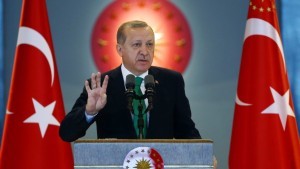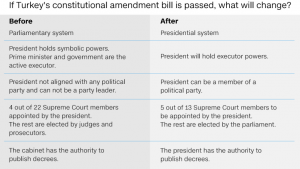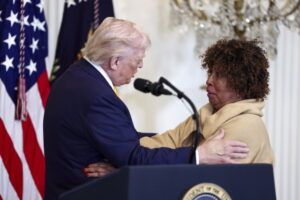International election monitors have delivered a scathing verdict on the conduct of Turkey’s controversial referendum to grant expansive new powers to President Recep Tayyip Erdogan.
Representatives from a coalition of international bodies said the vote took place on an “unlevel playing field” with the “yes” campaign dominating media coverage. Voters were not provided with adequate information, opposition voices were muzzled and the rules were changed at the last minute, they said.
“The legal framework remained inadequate for the holding of a genuinely democratic referendum,” the monitors’ initial report stated.
Erdogan’s margin of victory in the referendum was razor-thin. Despite a state of emergency and a widespread crackdown on dissent, he succeeded in persuading only 51.4% of voters to back his constitutional upheaval.
The three biggest cities in Turkey — Ankara, Istanbul and Izmir — rejected the plans, which would abolish Turkey’s system of parliamentary democracy and replace it with an executive presidency with sweeping, largely unchecked powers.
Opposition groups vowed to challenge the outcome, citing a rule change to allow unstamped ballots, announced after polls had opened.
European governments acknowledged the result but bristled at a suggestion by Erdogan that he would seek the restoration of the death penalty — a move that would sink Turkey’s long-stalled bid to join the European Union.
The results cement a years-long effort by Erdogan to consolidate his position. After serving as prime minister for nearly a decade, he took over as president in 2014 and through force of personality turned a largely ceremonial role into a de facto head of government.
A failed coup last year allowed him to turn up the heat on opposition voices in the run-up to Sunday’s referendum. The “no” campaign said it faced intimidation and threats of violence, while opposition figures and journalists were jailed. The narrowness of the result, coupled with allegations of irregularities, sets the scene for further instability.
Criticism from monitors
The monitors — a partnership of the Organization for Security and Cooperation in Europe and the Council for Europe — offered a harsh analysis on the way the referendum was conducted.
Presenting their preliminary findings at a news briefing in Ankara, Tana de Zulueta, head of the monitoring mission, described a litany of shortcomings.
– The state of emergency imposed after a failed coup last July had a profound effect on the political process. “Fundamental freedoms essential to a genuinely democratic process were curtailed,” the monitors’ report said. “The dismissal or detention of thousands of citizens negatively affected the political environment.”
– State media was biased in favor of Erdogan and did not adequately cover opposition. “The legal framework for the referendum neither sufficiently provides for impartial coverage nor guarantees eligible political parties equal access to public media,” she said.
– Monitors saw “no” supporters subjected to police intervention at events and senior officials in the “yes” camp equated them with terrorists.
– The involvement of Erdogan and other national and local public figures in the “yes” campaign led to a “restrictive” and “imbalanced” campaign framework, she said.
– The decision on referendum day to allow unstamped ballots “significantly changed the ballot validity criteria, undermining an important safeguard and contradicting the law.”
Erdogan claims victory
Erdogan showed no signs of being cowed by the narrow margin of victory. In a rousing speech to supporters in Ankara, he hailed the result and attacked his Western critics. The vote demonstrated that Turkish people had said “Yes to a single nation. Yes to a single flag…Yes to a single state,” he said.
He reiterated his desire to restore the death penalty as crowds chanted: “We want capital punishment.”
Bulent Tezcan, deputy chairman of the main opposition party, the CHP, said his party would contest the result in Turkey and, if necessary, at the European Court of Human Rights.
“The only decision that will end legitimacy debate and ease people’s concerns about the judiciary is for the High Election Board to cancel the referendum,” Tezcan said.
‘Profound changes’
Once confirmed, moves could get underway to implement the 18-article reform package put forward by the ruling Justice and Development Party (AKP).
They include:
- Abolishing the post of prime minister and replacing it with a powerful executive president with powers to rule by decree.
- Giving the president the power to appoint a cabinet and some senior judges.
- Curbing the power of parliament to scrutinize legislation.
- Resetting term limits for president, meaning Erdogan could serve until 2029 if he wins elections in 2019 and 2024.
Ahmet Kasim Han, an associate professor at Kadir Has University in Istanbul, said the result would “profoundly change the way the country is governed.”
Critics of the proposals say they give overly broad powers to the president, Han said. Supporters of the “Yes” result argue the changes are justified given the “existential threat” on the country’s southern borders with Iraq and Syria, along with last summer’s attempted coup, he added.
Caution from Europe
German Chancellor Angela Merkel said the result showed that “Turkish society is deeply divided” and called for the Turkish government to engage in “respectful dialogue” with all political entities.
In a joint statement with Foreign Minister Sigmar Gabriel, she called on the Turkish government to “address concerns” about the voting process.
The office of the French President, Francois Hollande, warned that any referendum in Turkey on the reinstatement of the death penalty would constitute a break with EU values and commitments.
The Council of Europe, a human rights organization which promotes European values and of which Turkey is a member, said the tight vote meant the country would have to proceed with caution.
“In view of the close result the Turkish leadership should consider the next steps carefully,” said the statement from Secretary General Thorbjorn Jagland.
Joy and despair
As the results came in, thousands of the president’s supporters converged at the Ankara headquarters of the AKP, which Ergodan founded.Waving flags they shouted, “Tell us to kill, we will kill. Tell us to die, we will die. Erdogan, Erdogan, Erdogan.”
But there were just as many who were devastated by the result.
Umut Serin, a 32-year-old marine engineer who was working at a polling station in central Istanbul told CNN: “The government tried to reflect it as if the yes votes were clearly ahead, from the very start. They created this perception through the media. There was huge pressure on TV channels.”
Serkan Taskent, 31, a PHD student in Istanbul, said the opposition was not strong enough to stop the reforms going ahead. “If the opposition continues to be this ineffective, which looks like it’s going to be, then it will be very hard to bring the 23.7 million opposition voters to the ballots again.”
Ask me anything
Explore related questions






